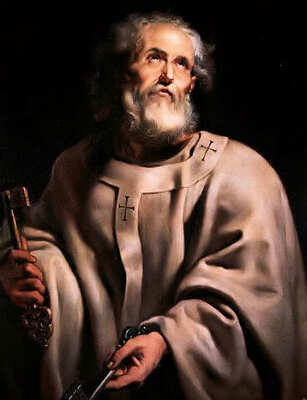1 Peter 4:12-5:14
Lesson 451
Read both the "King James Bible" and the "New Living Translation."
Simon Peter
In this lesson:
Suffering and humility (4:12-19).
Elders (5:1-4).
Submission and humility (5:5-11).
Peter's final benediction (5:12-14).
This is an excellent passage to read when ill, in pain, worried, or in crisis.
Suffering and humility (4:12-19).
Elders (5:1-4).
Submission and humility (5:5-11).
Peter's final benediction (5:12-14).
This is an excellent passage to read when ill, in pain, worried, or in crisis.
Mark
By the Dutch Golden Age painter Frans Hals (1580-1666).
By the Dutch Golden Age painter Frans Hals (1580-1666).
Who was -
Silvanus -
Silvanus (Latin name Silas) was a Jewish convert to Christianity. He was a Roman citizen (Acts 16:21; 16:37) and
"faithful" believer (1 Peter 5:12), a prophet (Acts 15:32), leader in the Jerusalem church (Acts 15:22), and missionary (2 Corinthians 1:19). Silvanus replaced Barnabas on Paul's second missionary journey (Acts 15:37-40), and helped
establish the church in Thessalonica (Acts 17:1-4). He also helped Peter write 1 Thessalonians (1:1), 2 Thessalonians (1:1), and he delivered "The First Epistle General of Peter" (1 Peter 5:12). While in Philippi, Silvanus and Paul were stripped, beaten, chained, and imprisoned for their Christian faith (Acts 16:19-24). There are Bible scholars who believe he was also the bishop of Corinth. However, we cannot be sure.
Marcus -
Marcus was also called Mark or John Mark. Marcus was a converted Jew and Barnabas' cousin (Colossians 4:10). His mother, Mary, turned her home into a Christian meeting place (Acts 12:12). Although Marcus was not one of the original twelve disciples, he almost certainly knew Jesus personally. Some Bible scholars believe he was the naked man seen fleeing Gethsemane Garden as Jesus was arrested (Mark 14:51-52). Marcus joined Paul on his first missionary journey (Acts 12:25; 13:5). However, he fell out of favor with Paul when he left the mission early to return home to Jerusalem (Acts 13:13). Paul's disappointment in Marcus created a rift with Barnabas (Acts 15:36-40). Marcus eventually regained Paul's confidence (2 Timothy 4:11) and stood with Paul during his first imprisonment in Rome (Philemon 1:23-24). Marcus visited numerous countries witnessing and wrote "The Gospel According to Mark," probably while in Rome when the persecution of Christians was on the rise. He also traveled with and was like a son to the apostle Peter (1 Peter 5:13). Mark was with Peter when he wrote "The First Epistle General of Peter" (1 Peter 5:13), and many scholars believe he was Peter's interpreter. It is thought that he was a Roman citizen and that he founded the church in Alexandra, where he died during the eighth year of the Roman Emperor Nero's reign.
Silvanus -
Silvanus (Latin name Silas) was a Jewish convert to Christianity. He was a Roman citizen (Acts 16:21; 16:37) and
"faithful" believer (1 Peter 5:12), a prophet (Acts 15:32), leader in the Jerusalem church (Acts 15:22), and missionary (2 Corinthians 1:19). Silvanus replaced Barnabas on Paul's second missionary journey (Acts 15:37-40), and helped
establish the church in Thessalonica (Acts 17:1-4). He also helped Peter write 1 Thessalonians (1:1), 2 Thessalonians (1:1), and he delivered "The First Epistle General of Peter" (1 Peter 5:12). While in Philippi, Silvanus and Paul were stripped, beaten, chained, and imprisoned for their Christian faith (Acts 16:19-24). There are Bible scholars who believe he was also the bishop of Corinth. However, we cannot be sure.
Marcus -
Marcus was also called Mark or John Mark. Marcus was a converted Jew and Barnabas' cousin (Colossians 4:10). His mother, Mary, turned her home into a Christian meeting place (Acts 12:12). Although Marcus was not one of the original twelve disciples, he almost certainly knew Jesus personally. Some Bible scholars believe he was the naked man seen fleeing Gethsemane Garden as Jesus was arrested (Mark 14:51-52). Marcus joined Paul on his first missionary journey (Acts 12:25; 13:5). However, he fell out of favor with Paul when he left the mission early to return home to Jerusalem (Acts 13:13). Paul's disappointment in Marcus created a rift with Barnabas (Acts 15:36-40). Marcus eventually regained Paul's confidence (2 Timothy 4:11) and stood with Paul during his first imprisonment in Rome (Philemon 1:23-24). Marcus visited numerous countries witnessing and wrote "The Gospel According to Mark," probably while in Rome when the persecution of Christians was on the rise. He also traveled with and was like a son to the apostle Peter (1 Peter 5:13). Mark was with Peter when he wrote "The First Epistle General of Peter" (1 Peter 5:13), and many scholars believe he was Peter's interpreter. It is thought that he was a Roman citizen and that he founded the church in Alexandra, where he died during the eighth year of the Roman Emperor Nero's reign.
Study Tip:
Reading Bible passages a second time reinforces lessons learned and helps you catch vital points you might have missed with the first read.
Reading Bible passages a second time reinforces lessons learned and helps you catch vital points you might have missed with the first read.











